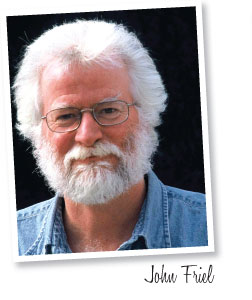10/1/2019
If You Show It, They May Come
John Friel

The 2019 summer trade show season was a mixed bag. The crush of Cultivate’19 preceded an encouraging, well-attended Perennial Plant Association Symposium in Chicago, followed by three mostly slow days at the Farwest Show. A colleague reported a solid TNLA.
Farwest had its high points: decent floor traffic, good conversations. Just one of those can pay for multiple booths. And it’s always a kick to strut your new stuff. Nobody ever asks, “What’s old?”
Trade show moments aren’t always the kind you can bullet-point in a brochure. The most intriguing new perennial I saw this summer was on an iPhone, not in a New Varieties display. The (potentially) most fruitful conversations weren’t about plants, specifically, but about shipping large orders long distances. The highest Farwest highlight wasn’t on the show floor: It was the keynote speech by Dr. Charlie Hall, our fiscal conscience.
We know we have blind spots. There are murky places where production and landed costs scurry and hide like cockroaches. There are forces as unpredictable and uncontrollable as the weather, questions we don’t like to ask: Is a recession coming? When? What will Washington do next and do we still have any friends there? How much IS a billion dollars, anyway?
Charlie shines a cheerful light into those inky shadows. He makes numbers approachable and entertaining, even to a math-phobic wordsmith.
Let’s start with big numbers. Said Charlie, “It would take 32 years to count to a billion. It would take 36,000 years to count to a trillion.” Who can challenge that? Obviously no one has done either. I can’t imagine a greater waste of time, other than binge-watching “Amish Mafia.”
Charlie cautioned, “The sky isn't falling—yet. But we’re overdue for a recession.” When? “Crap, I don’t know.” But he reckons the odds of a market “correction” will hit 50% next year, 80% by 2021. Keep that umbrella handy.
I frankly didn’t understand all of Charlie's charts. He sees patterns and trends in squiggly lines plotted across arbitrary grids; maybe you can, too. To me, they’re as legible as tea leaves and entrails, in which some allegedly see the future. Wizardry.
Suddenly, one made sense: a flow chart, an industry snapshot in text blocks connected by swooping arrows. I don’t recall it all, but I immediately knew it was right-side-up: The consumer was on top. Suppliers? At the very bottom.
I think many of us (not you, of course) see that relationship otherwise. We picture our products, the fruits of our sweat and wisdom, showering down like manna unto the naive gardening public. Turn that mental image around. Our sustenance rains from consumers’ wallets to nurture our roots. We’re not the apex of this food chain.
Back to that intriguing life form, the trade show. The successful ones shine brightly, until they don’t. When they fail, they may flicker for years. I’ve worked a handful that no longer exist.
Is this true in other fields? Crap, I don't know, but probably yes. The only non-green event I’ve attended was TS2, the Trade Show About Trade Shows. It was an eye-opening display of displays, a playground for big-margin players—pharmaceuticals, aeronautics, medical imaging. The graphics and electronics cost more than growers would countenance.
Here, “sell” was an active, not passive, verb. By comparison, we’re wallflowers. We smile, we nod, we greet, but TS2’s vendors seemed poised to pounce, willing to pursue me to my car if I made eye contact.
Well, TS2 flickered out around 2011. We laid-back wallflowers are still grippin’ and grinnin’ at shows that have lasted half a century. Know thy audience. GP
John Friel is marketing manager for Emerald Coast Growers and a freelance writer.